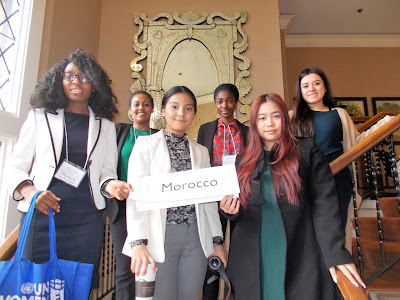Global Awareness of Cottey Students Grows at Model United Nations
By Beth Hammock, Executive
Director of Marketing and Communication, and Kidest Ketema, Class of 2019
Cottey College believes students will become better leaders when they are more globally aware. We want them to learn about cultures, politics, economics and much more. So when seven students returned from the 59th Midwest Model United Nations in late February, we were thrilled to hear their enthusiasm!
At the Model U.N. in St. Louis, students acted as if they were United Nations diplomats. The goal was to gain a better understanding of global issues and the role of the United Nations. Five of the seven Cottey students who attended are international students, which enhanced the exchange of ideas at the conference.
“I am both an international
student and a freshman, and this experience opened my eyes to the broader
outside world,” said Htet Thazin Myo
Lwin, a native of Myanmar. “It introduced me to the world of diplomacy
and lots of intellects from other universities and colleges, and that truly
inspired me.”
Each institution at the Model U.N.
represents a country. Cottey was assigned Morocco. Students serve on committees
existing at the real U.N.
Lwin was Morocco’s representative
for the United Nations Educational, Scientific and Cultural Organization
(UNESCO). This committee is responsible for promoting collaboration among
states regards science, technology, communication, and education that will help
secure international peace and security. She researched and presented on three
topics: Return and Restitution of Cultural Property; Traditional Knowledge
Systems; and Bioethics and the Human Genome.
La Min Thiri, also from Myanmar,
was Morocco’s delegate on the Second Committee, one of the principal organs of
the General Assembly. She researched and presented on Women in Development and
Implementation of the Convention on Biological Diversity.
“I learned how to negotiate,
persuade and cooperate with other countries,” Thiri says. “Also, I was able to
keep calm when encountering a disagreement, exhibiting decorum and using
diplomatic language at all times. Overall, it was a great experience, and I
believe anyone wanting to become a politician or is interested in politics should
attend this conference at least once.”
Christi-Anne Beatty, of Lakeside
Park, Kentucky, and Rimsa Upreti, of Nepal, were First Committee delegates of
Morocco. This committee works toward addressing issues such as disarmament and
the threats of international peace and security. Within the committee, each country
can discuss their positions on disarmament-related matters. Beatty and Rimsa researched
and presented on The Illicit Trade in Small Arms and Light Weapons in All its
Aspects and The Role of Science and Technology in the Context of International
Security and Disarmament.
“This was a great experience for
me, as I got to learn
how important the interdependence of
countries in the world is for the secured future of everyone,” says
Upreti. “This was indeed one of the best
experiences I have had in my life!”
Her partner agrees about the
conference being a life-changing experience.
“It was the
most exciting, shaping, mentally challenging and educational four days of my
life!” Beatty says. “I was able to speak with delegates from other countries
about United Nations programs like UNODA and UNICEF that could help link
developed and developing countries. I am extremely thankful for the opportunity
to have this experience and recommend it greatly.”
Kidest Ketema, from Ethiopia, was
a Second Committee delegate of Morocco. This committee carries out an agenda
that ranges from social, humanitarian and cultural issues. The main focus of
the committee’s work is on the examination of human rights questions, such as
advancement of women, the protection of children, refugees and racism. She
researched and presented on Promoting the Inclusion of Women and Youth in
Governance and the Rights of Persons with Disabilities.
“The
lesson I got from this conference is how to be diplomatic and a better future leader,” Ketema
says. “For anyone interested, I would suggest they take advantage of this
rewarding opportunity.”
 Joan Dwomoh-Okudzeto, of Ghana,
was on the Fourth Committee of the General Assembly. The Fourth Committee is responsible for issues such as
decolonization, international cooperation for the peaceful uses of outer space,
effects of atomic radiation, assistance to Palestinian refugees and
peacekeeping operation. She researched and presented on International Cooperation
in the Peaceful Uses of Outer Space, and Assistance in Mine Action.
Joan Dwomoh-Okudzeto, of Ghana,
was on the Fourth Committee of the General Assembly. The Fourth Committee is responsible for issues such as
decolonization, international cooperation for the peaceful uses of outer space,
effects of atomic radiation, assistance to Palestinian refugees and
peacekeeping operation. She researched and presented on International Cooperation
in the Peaceful Uses of Outer Space, and Assistance in Mine Action.
“This program broadened my
intellect by exposing me to areas that involved improving lives of people all
across the world,” Dwomoh-Okudzeto says. “It was an amazing experience that was
full of interesting events that go on in the United Nations.”
Rebeca Dorantes of Park Forest,
Illinois, was the Economic and Social Council (ECOSOC) delegate of Morocco. This
committee acts as a forum for member states to discuss economic, social, development
and environmental issues. Topics she researched and presented include South-South
Cooperation, the Use of Restorative Justice Systems and Sustainable Alternative
Development.
“Model
U.N. was a powerful program, allowing students to come together to discuss
global issues in an environment that promotes cooperation knowledge, and
diplomacy,” Dorantes says. “It is a wonderful experience.”
Dr. Kanji Watanabe accompanied
the students to St. Louis. He is an associate professor of political
science/international relations at Cottey College. Originally from Japan, Dr.
Watanabe has traveled to more than 40 countries and uses this experience in the
classroom.
Cottey College offers degrees in political science,
international business, international relations, organizational leadership and many other liberal arts and science fields related to the
topics the students researched and presented at the Model U.N. Learn more about
Cottey’s degree programs here.





Comments
Post a Comment